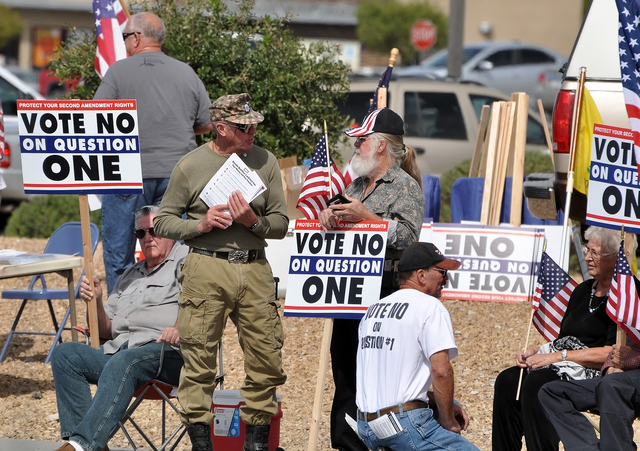
Intense debates about a Nevada ballot measure that would expand background checks for firearms buyers has shifted to nuanced questions about what it would require and how it is written.
The pressure is mounting for gun rights advocates: There are indications that Question 1 has enough support to pass.
Gun enthusiasts who guard the Second Amendment with near-religious zeal look at a measure to expand firearm background checks to private-party sales and transfers and see a slippery slope that ends in the mass confiscation of firearms.
Opponents of the ballot measure continue to argue that it was poorly written and would have little effect on gun violence.
And gun control advocates are just as passionate. They see the lives lost in multiple-victim shootings at a government building in San Bernardino, California, and a gay nightclub in Orlando, Florida, and an elementary school in Newtown, Connecticut. They see an opportunity to save lives by making gun owners jump through a few extra hoops.
It could be a turning point for the state: Will it stand pat or will it follow California’s lead and regulate guns more? Nevada voters will decide Nov. 8.
A poll commissioned by the Las Vegas Review-Journal measured strong support for the measure. Fifty-four percent of poll respondents supported Question 1, 38 percent opposed it and 8 percent didn’t answer or said they didn’t know.
The Background Check Initiative has broad support among registered Democrats, who have an edge in voter registration and have dominated in early voting.
Still, many rhetorical squabbles based on interpretations of the exceptions outlined in the proposed law remain.
Exception exemptions
Opponents of Question 1 have made several claims about the exceptions written into the universal background check measure that include police officers, antique guns and immediate family members.
The National Rifle Association pointed out that the language of the exceptions doesn’t include concealed weapons holders. Under current laws, people with a permit to carry a concealed weapon are exempted from background checks beyond those required to get a permit.
But under Question 1, concealed weapons permittees would have to undergo background checks for private-party sales and transfers, said Ryan Hamilton of the NRA Nevadans for Freedom campaign.
“It bifurcates the system for CCW holders,” he said. “That’s just another downstream consequence of Question 1.”
Nevadans for Background Checks, the PAC pushing for passage of the ballot initiative, has a different interpretation.
“Essentially, nothing changes,” said Communications Director Jennifer Crowe. Concealed weapons permit holders will have to present their permit in place of a background check, just like they do at gun stores.
Opponents have also zeroed in on the language that would grant an exception to someone wanting to borrow a gun to go to an “established shooting range,” saying that it isn’t clear what an established range is and that it doesn’t include target shooting on public lands.
State Sen. James Settlemeyer, R-Minden, expressed concern over the “established shooting range” provision, arguing that most rural residents are more likely to go to U.S. Forest Service or Bureau of Land Management land to try out new guns and shoot at targets.
“We tend to not go to licensed shooting facilities,” he said. “We just go out back.” Crowe said local ordinances determine where it is acceptable to go shooting.
Rural concerns
Settlemeyer said there are other rural concerns as well. He said rifles owned by his ranch and used by ranch hands to keep coyotes and such from “going after calves” would need background checks every time they did a shift change or they would be criminals.
Gun rights advocates maintain the exception allowing temporary gun transfers “while in the presence of the transferor” means that you would be a criminal if you walked away for a minute while someone else was using your gun.
Crowe said the intent of the law isn’t to have “police hiding in the bushes, waiting to go after hunters,” and is meant to target dangerous criminals.
But the law does require the gun owner to be in the presence of the borrower.
“It’s about what happens when you give your gun to someone outside of your supervision,” she said of the intent of the measure.
An analysis of the ballot initiative by the Kenny Guinn Center for Policy Priorities dismissed opponents’ concerns that it would be hard to get background checks in rural Nevada.
The nonpartisan Nevada think tank did not take a position on Question 1, but it found that there are more Federal Firearm Licensees, the gun retailers who would perform the checks, in rural counties than there are in Clark or Washoe counties, the most populous counties in the state.
Elected sheriffs across the state — except for Clark County Sheriff Joe Lombardo, who has stayed neutral — have come out against the measure, saying that it would burden already-tight law enforcement resources in rural communities.
Several rural sheriffs have no intention of enforcing the law, Settlemeyer said.
At a meeting with the Review-Journal’s editorial board last week, Crowe chalked that up to rural politicians’ prioritizing the Second Amendment of the U.S. Constitution over public safety. Settlemeyer scoffed at the argument.
“The Constitution is the Constitution,” he said.
Besides, he said, “This does absolutely nothing for public safety.”
Contact Wesley Juhl at wjuhl@reviewjournal.com. Follow @WesJuhl on Twitter.